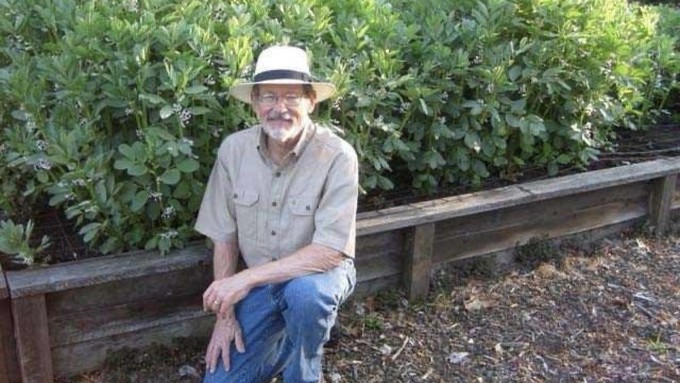
After heart surgery, popular garden expert changed his life with homegrown vegetables, fruit

"Farmer Fred" Hoffman will speak at the Feb. 8 meeting of the Sacramento Rose Society. Courtesy Fred Hoffman
Farmer Fred will present his personal story of heart-healthy gardening and discovery at 7:30 p.m. Thursday, Feb. 8, at the club’s meeting at the Shepard Garden and Arts Center in McKinley Park. The public is welcome. Admission and parking are free.
Farmer Fred knows firsthand how his own heart-healthy garden changed his life. In March 2012, the award-winning radio host was diagnosed with FOUR cholesterol-blocked heart arteries. His doctor also told him he had full-blown Type 2 diabetes. (His A1C was 10.4.)
He underwent quadruple coronary artery bypass graft surgery, then embarked on the long road to healing. That included a makeover of his diet.
Farmer Fred lost more than 60 pounds – and kept the weight off. An avid cyclist, he rides his bike more than 100 miles a week. He no longer needs to take diabetes medication and is active as ever in his garden and the community.
His secret? Growing, and eating, heart-healthy fruits and vegetables, loaded with fiber. That includes artichokes, blueberries, apricots, shell beans and green peas.
Farmer Fred will share how anyone can help their own heart health via fiber-packed fruit and vegetables. Besides his personal health experience, he’s also one of the leading gardening experts in California. A lifetime master gardener, Fred has been certified by the UC Cooperative Extension program for more than 40 years and has logged well over 10,000 hours as a master gardener volunteer.
Most Sacramentans know Farmer Fred from his four decades as host of his award-winning radio shows, “Get Growing with Farmer Fred,” “The KFBK Garden Show” and “The KSTE Farm Hour.” Now he shares his talents with a national audience online via his podcast, “Garden Basics with Farmer Fred.”
His garden has evolved, too. He and his wife, Jeanne, traded their 10-acre ranchette in Herald for a suburban home and backyard in Folsom. Although his garden’s footprint is much smaller, it’s still packed with the heart-healthy foods that changed his life.
Come hear Farmer Fred and learn how you, too, can make a difference in your own heart health. Shepard Center is located at 3330 McKinley Blvd., Sacramento.
Details: https://sacramentorosesociety.org/ or www.farmerfred.com.
Comments
0 comments have been posted.Sacramento Digs Gardening to your inbox.
Food in My Back Yard Series
May 6: Maintain soil moisture with mulch for garden success
April 29: What's (already) wrong with my tomato plants?
April 22: Should you stock up on fertilizer? (Yes!)
April 15: Grow culinary herbs in containers
April 8: When to plant summer vegetables
April 1: Don't be fooled by these garden myths
March 25: Fertilizer tips: How to 'feed' your vegetables for healthy growth
March 18: Time to give vegetable seedlings some more space
March 11: Ways to win the fight against weeds
March 4: Potatoes from the garden
Feb. 25: Plant a fruit tree now -- for later
Feb. 18: How to squeeze more food into less space
Feb. 11: When to plant? Consider staggering your transplants
Feb. 4: Starting in seed starting
Sites We Like
Garden Checklist for week of May 11
Make the most of the lower temperatures early in the week. We’ll be back in the 80s by Thursday.
* Plant, plant, plant! It’s prime planting season in the Sacramento area. Time to set out those tomato transplants along with peppers and eggplants. Pinch off any flowers on new transplants to make them concentrate on establishing roots instead of setting premature fruit.
* Direct-seed melons, cucumbers, summer squash, corn, radishes, pumpkins and annual herbs such as basil.
* Harvest cabbage, lettuce, peas and green onions.
* In the flower garden, direct-seed sunflowers, cosmos, salvia, zinnias, marigolds, celosia and asters. (You also can transplant seedlings for many of the same flowers.)
* Plant dahlia tubers.
* Transplant petunias, marigolds and perennial flowers such as astilbe, columbine, coneflowers, coreopsis, dahlias, rudbeckia and verbena.
* Keep an eye out for slugs, snails, earwigs and aphids that want to dine on tender new growth.
* Feed summer bloomers with a balanced fertilizer.
* For continued bloom, cut off spent flowers on roses as well as other flowering plants.
* Add mulch to the garden to maintain moisture. Mulch also cuts down on weeds. But don’t let it mound around the stems or trunks of trees or shrubs. Leave about a 6-inch-to-1-foot circle to avoid crown rot or other problems.
* Remember to weed! Pull those nasties before they set seed.
* Water early in the day and keep seedlings evenly moist.